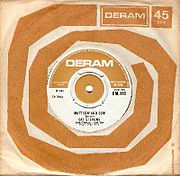- Deram Records
-
Deram Records 
Parent company Decca Records (UK) Founded 1966 Genre Pop Country of origin England Location London Deram Records was a subsidiary record label established in 1966 by Decca Records in the United Kingdom. At this time U.K. Decca was a completely different company than the Decca label in the United States, which was then owned by MCA Inc. Deram recordings were also distributed in the U.S. through UK Decca's American branch, called London Records. Deram was active until 1979.
Contents
1966-1968
Decca initially conceived Deram Records initially as an outlet for stereo 'Deramic Sound' recordings of contemporary Pop and Rock music, though not all of the early recordings on Deram used this technique. The new recording concept allowed for more space between instruments, rendering these sounds softer to the ear. Early stereo recordings of popular music usually were mixed with sounds to the hard left, center, or hard right only. This was because of the technical limitations of the professional 4-track reel-to-reel recorders which were state of the art until about 1967. 'Deramic Sound' was intended to create recordings that had a more natural stereo spread. The basic difference was that, instead of overdubbing and mixing 4 individual (mono) tracks from a 4-track recorder, the Decca recording engineers used a pair of 4-track machines to layer multiple 2-channel (stereo) recordings. This new concept with additional tracks permitted instruments to be heard more easily from any position within the stereo field.
To launch the 'Deramic Sound' concept Deram issued a series of six Easy listening orchestral pop albums in October 1967. The albums all included the word Night in the title, i.e. Strings in the Night, Brass in the Night, etc. The label was soon moulded into a home for 'alternative' or 'progressive' artists. Among the first recordings in this series was the November 1967 album release Days of Future Passed by The Moody Blues.
Professional quality 8-track recorders began to appear in many British studios starting with Advision Studios and Trident Studios in 1968. These 8-track machines were far more flexible than the dual 4-track recorder setup. Since Decca engineers no longer had more tracks than other major studios the 'Deramic Sound' concept quickly became outdated and was dropped.
1969-1979
The roster later included British jazz and folk as well. Some of the more progressive jazz musicians of the late 1960s were released under the Deram imprint including Mike Gibbs, John Surman and Mike Westbrook. Deram albums bore a DML prefix for mono and an SML prefix for stereo releases. As with other UK Decca subsidiary labels, Deram's U.S. counterpart was distributed under the London Records arm. Decca positioned it against Island Records, Harvest Records (launched by EMI) and Vertigo Records (launched by Philips Records), but it failed to compete long-term. An 'extra' progressive series with SDL prefixes did not improve the situation.
From the start, Decca placed pop records alongside progressive artists on Deram. Cat Stevens found early success on there before moving to Island Records and David Bowie's first album appeared on the label. Three of Deram's earliest hits, Procol Harum's "A Whiter Shade of Pale", The Move's "Night of Fear" and "I Can Hear the Grass Grow" were not artists actually signed to Deram; they were part of a deal with Straight Ahead Productions, who moved their acts to EMI and had them released on the reintroduced Regal Zonophone imprint.
In 1969, Decca launched a true progressive label called Nova, which lasted less than a year. This caused further confusion as simultaneous releases on "Deram Nova" and "Decca Nova" appeared.
Decca released Justin Hayward (of Moody Blues fame)'s Songwriter (1977) and Night Flight (1980) vinyl albums on Deram. Deram was briefly revived in the early 1980s, when its roster included Bananarama, The Mo-dettes and Splodgenessabounds. Deram has also been used as a reissue imprint for the Decca/London catalogue.
Artists
- Aardvark
- Johnny Almond Music Machine
- Amen Corner
- Lionel Bart
- B-Movie
- Beefcake
- David Bowie (debut album)
- The Alan Bown Set
- Brotherhood of Man
- Pete Brown
- Camel
- The Camerata Contemporary Chamber Group
- John Cameron Quartet
- Junior Campbell
- Caravan
- Michael Chapman
- Chicken Shack
- Clouds
- Shirley Collins
- Curved Air
- Terry Durham
- East of Eden
- Egg
- Eyes of Blue
- Bill Fay
- The Flirtations
- The Flower Pot Men
- Frijid Pink
- Galliard
- Giles, Giles and Fripp
- Kathe Green
- Keef Hartley
- The Hawaiians
- Honeybus
- Hunter Muskett
- Clark Hutchison
- Iron Virgin
- Chim Kothari
- Alvin Lee & Company
- Neil MacArthur (pseudonym for Colin Blunstone)
- Stavely Makepeace
- Mellow Candle
- The Mo-dettes
- The Moody Blues
- The Move
- Pacific Drift
- The Parlour Band
- Principal Edwards
- Procol Harum
- Les Reed
- Room
- George "Harmonica" Smith
- Whistling Jack Smith
- Cat Stevens
- Streak
- Stud
- The Syn
- Ten Years After
- Tintern Abbey
- Thin Lizzy
- TV21
- Darryl Way's Wolf
- The Web
- The World of Oz
- White Plains
- Zakarrias
See also
References
- Pelletier, Paul (June 1981). Record Collector: 45–47.
- Pelletier, Paul (July 1981). Record Collector: 46–49.
- Doggett, Peter (December 1988). "Deram Psychedelia". Record Collector (112): 55–59.
External links
Categories:- Alternative rock record labels
- British record labels
- Jazz record labels
- Record labels established in 1966
- Record labels disestablished in 1979
- Re-established companies
- Progressive rock record labels
- Rock record labels
Wikimedia Foundation. 2010.
